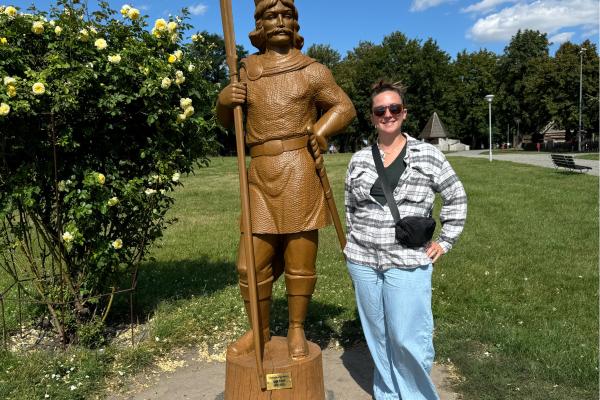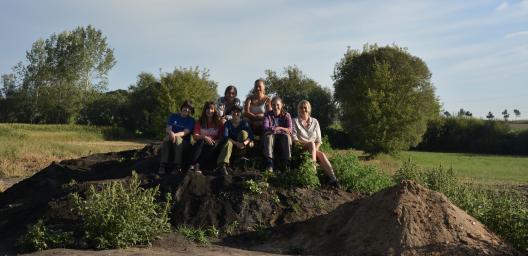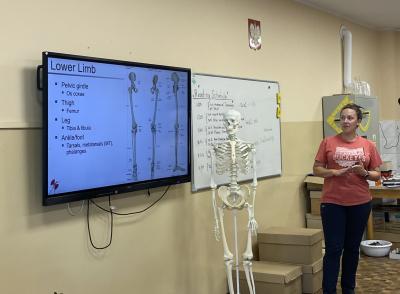Connecting the Past to the Present: Lauren Hayden's Summer in Giecz, Poland

Lauren Hayden is a PhD student in the Department of Anthropology and a recipient of a 2024 Polish Studies Initiative (PSI) scholarship. She recently traveled to Giecz, Poland to participate in the Slavia Foundation's Mortuary Field School Program where she had the opportunity to be both a student and educator. Read more about her adventures below.
This past summer marked my third consecutive summer traveling to Poland and the second in which I had the privilege of helping lead two sessions of a medieval bioarchaeology field school in Giecz, Poland, organized through the Slavia Foundation. My journey from June through August 2024 was made possible by the Polish Studies Initiative scholarship administered by the Center for Slavic, East European and Eurasian Studies. The support I received through this scholarship was instrumental in funding my travel, making this enriching experience possible. It allowed me to fully immerse myself in the academic and cultural aspects of this unique experience. The opportunity to work in Giecz allowed me to begin my data collection on the 11th and 12th-century population and to grow as an educator.
One of the most invaluable aspects of this experience was the cultural exchange and the deep connections I developed with my Polish colleagues and the local community. Being immersed in the small farming villages surrounding Giecz, I gained insights into the historical context of my research and the modern Polish way of life. Daily interactions with Polish archaeologists and staff significantly improved my language skills, a personal growth I deeply value. My colleagues were patient and supportive, helping me to fine-tune my pronunciation and understand the subtle nuances of the Polish language. These interactions enhanced my listening and speaking skills and deepened my appreciation for Polish culture and the importance of language in facilitating collaboration.
The field school provides an exceptional environment for academic growth and teaching. Over the course of two sessions, I had the opportunity to instruct 23 students in human osteology and hands-on fieldwork techniques, guiding them through the process of excavating and analyzing medieval skeletal remains. The collaboration between the students, the Polish archaeologists, and myself was a rewarding experience, as we all worked toward the shared goal of preserving and understanding more about the medieval population we were uncovering. This hands-on experience was pivotal for the students, many of whom will go on to be future archaeologists, and it reminded me of the importance of networking and building relationships in our small, yet globalized field.

My time in Giecz allowed me to continue my research, focusing on the health and stress markers of the 11th-12th century population. The field school provided me with access to a skeletal collection and enabled me to examine stress indicators of health, such as linear enamel hypoplasia (LEH). Working in collaboration with Polish archaeologists and utilizing innovative analysis methods, I gained valuable data that will contribute to my ongoing research on how political, socioeconomic, and religious shifts influenced the health of this population. This experience reinforced the importance of interdisciplinary collaboration in advancing archaeological research.
Looking ahead, I am deeply grateful for the Polish Studies Initiative scholarship that made this summer’s work possible. The opportunity to enhance my Polish language skills, strengthen my research, and collaborate with Polish archaeologists has been immensely fulfilling. I look forward to returning to Poland for many more summers, continuing my research and collaboration with the local community. The friendships and professional connections I have built will undoubtedly shape my future work contributing to knowledge in the field of anthropology. I am excited to see how this research unfolds in the coming years.

Interested in learning more about the Polish Studies Initiative (PSI)? Visit the PSI webpage and be sure to sign up for our CSEEES the Day newsletter to find out when applications for 2025 PSI scholarships and grants will open.
